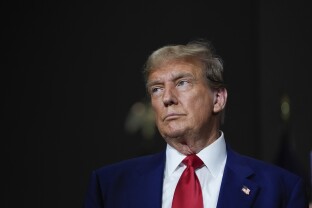Donald Trump faces a neatly packaged and nasty October surprise documenting his conduct leading up to the Jan. 6 insurrection from Justice Department special counsel Jack Smith.
After Thursday’s long-anticipated federal court hearing about Trump’s election interference case, the judge overseeing the case demanded prosecutors put together a formal report by Sept. 26 detailing why they believe Trump was acting as a private politician on Jan. 6 and not in his official capacity as president.
Prosecutors proposed filing such a report as a way to move the proceedings forward in light of the Supreme Court’s July opinion granting the former president an extensive and redefined version of presidential immunity.
Although it’s unclear how much new evidence would be on display, the plan put forward by prosecutors — and agreed to by the judge — threatens to once again direct the American public’s attention to Trump’s aggressive attempt to cling to power in 2020 in the closing weeks of this presidential election. It also highlights the fact that Trump’s criminal charges have not been dismissed.
U.S. District Judge Tanya Chutkan ordered Smith to file the report in three weeks.
A report of this nature, if filed in late September, could bolster the historical record about Trump’s behavior as an outgoing president, adding to what the House Jan. 6 committee released in December 2022.
Trump wasn’t in the courthouse Thursday when Smith, flanked by an extensive security detail and the rest of his team, met with his defense lawyers in this fourth-floor courtroom for the very first time since the Supreme Court’s opinion on presidential immunity. The Supreme Court’s opinion forced prosecutors to reset and whittle down their election interference case against him with a superseding indictment. Trump’s lawyers entered a not guilty plea on his behalf to the amended charges.
During the hearing, Chutkan openly contemplated how to move the case forward without repeat trips up the appellate ladder that could severely slow this case down.
Thomas Windham, a prosecutor, said his team is already putting together a comprehensive report that would carefully document how Trump’s conduct was “private in nature and not subject to immunity.” He said the court filing could be ready by Sept. 26, if the judge allows them to file it.
“We have begun, it is underway and we have to package the exhibits,” Windham said, referencing the “substantial number of exhibits” that hint at the sheer breadth of the evidence that could be on display.
He said evidence would largely consist of grand jury transcripts and “FBI 302s,” the paperwork that federal special agents use to memorialize interviews. That means the American public could get their first glimpse at what key witnesses — including Trump administration insiders and perhaps even Vice President Mike Pence himself — testified behind closed doors last year.
Windham asserted the filing was crucial in allowing Chutkan “to consider the circumstances, form and context” before determining whether the case can stand after the Supreme Court granted Trump a wall of protection on the grounds that official presidential conduct is completely off-limits to criminal charges.
The judge seemed to remain open to the idea of a minitrial around such a report — one that would feature lawyers arguing on both sides and even the appearance of witnesses.
Trump’s defense team fiercely pushed back on that proposed plan. John F. Lauro argued that the new indictment should, in effect, restart the clock — and automatically allow the former president to once again push for dismissing the case in its entirety.
Chutkan pushed back on that idea, noting, “You say a new indictment, but it’s a slimmed-down version. It’s not more, it’s less.”
However, Lauro pointed out that the revamped indictment still references Trump’s conversations with Pence, which the defense team interprets as completely protected by the Supreme Court’s immunity decision. Chutkan seemed unconvinced, but Lauro pressed anyway.
“We may be dealing with an illegitimate indictment from the get-go,” Lauro said.
Although court rules typically dictate dismissal motions as the natural next step, Chutkan reasoned that the Supreme Court first wanted her to determine the scope of Trump’s immunity — something that could be resolved by allowing prosecutors to file a report.
Courtroom tensions shot up when Lauro threatened to throw a wrench in prosecutors’ plans by suggesting they publish sealed information — like FBI interview documents and grand jury transcripts that he described as “incredibly exculpatory” — during what he called a “sensitive time” now.
Prosecutors reminded the court that the decision to unseal information isn’t up to Trump’s team, and Chutkan, who was sitting back in her black leather chair, leaned forward and used her left hand in a chopping motion as she corrected Lauro.
“Wait, wait. Let’s just discuss what this sensitive time is … the electoral process and the timing of the election is not relevant here. This court is not concerned with the electoral schedule. Yes, there’s an election coming,” she began.
“This case has been pending for almost a year. We’re hardly sprinting to a finish line here,” she added.
—
Jose Pagliery is a reporter at NOTUS.
Sign in
Log into your free account with your email. Don’t have one?
Check your email for a one-time code.
We sent a 4-digit code to . Enter the pin to confirm your account.
New code will be available in 1:00
Let’s try this again.
We encountered an error with the passcode sent to . Please reenter your email.


